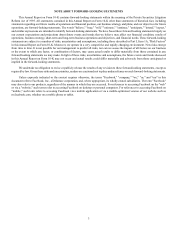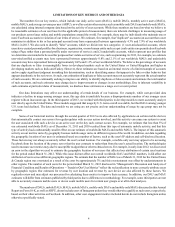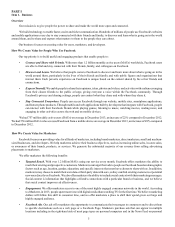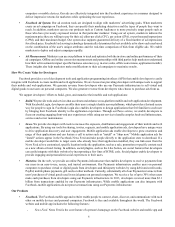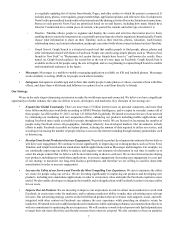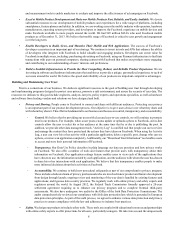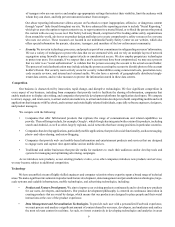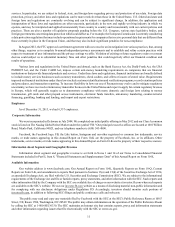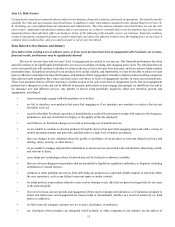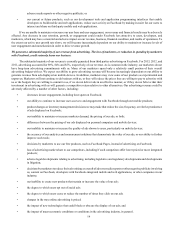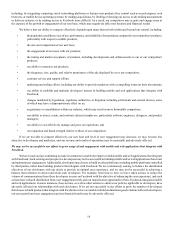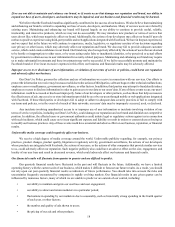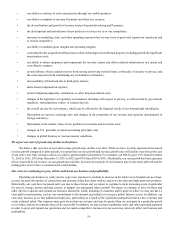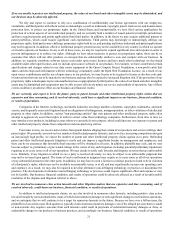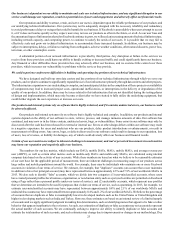Facebook 2013 Annual Report Download - page 15
Download and view the complete annual report
Please find page 15 of the 2013 Facebook annual report below. You can navigate through the pages in the report by either clicking on the pages listed below, or by using the keyword search tool below to find specific information within the annual report.13
Item 1A. Risk Factors
Certain factors may have a material adverse effect on our business, financial condition, and results of operations. You should consider
carefully the risks and uncertainties described below, in addition to other information contained in this Annual Report on Form 10-
K, including our consolidated financial statements and related notes. The risks and uncertainties described below are not the only
ones we face. Additional risks and uncertainties that we are unaware of, or that we currently believe are not material, may also become
important factors that adversely affect our business. If any of the following risks actually occurs, our business, financial condition,
results of operations, and future prospects could be materially and adversely affected. In that event, the trading price of our Class A
common stock could decline, and you could lose part or all of your investment.
Risks Related to Our Business and Industry
If we fail to retain existing users or add new users, or if our users decrease their level of engagement with Facebook, our revenue,
financial results, and business may be significantly harmed.
The size of our user base and our users' level of engagement are critical to our success. Our financial performance has been
and will continue to be significantly determined by our success in adding, retaining, and engaging active users. We anticipate that our
active user growth rate will continue to decline over time as the size of our active user base increases, and as we achieve higher market
penetration rates. If people do not perceive our products to be useful, reliable, and trustworthy, we may not be able to attract or retain
users or otherwise maintain or increase the frequency and duration of their engagement. A number of other social networking companies
that achieved early popularity have since seen their active user bases or levels of engagement decline, in some cases precipitously.
There is no guarantee that we will not experience a similar erosion of our active user base or engagement levels. Our user engagement
patterns have changed over time and can be difficult to measure, particularly as users engage increasingly via mobile devices and as
we introduce new and different services. Any number of factors could potentially negatively affect user retention, growth, and
engagement, including if:
• users increasingly engage with other products or activities;
• we fail to introduce new products that users find engaging or if we introduce new products or services that are not
favorably received;
• users feel that their Facebook experience is diminished as a result of the decisions we make with respect to the frequency,
prominence, and size of ads that we display, or the quality of the ads displayed;
• user behavior on Facebook changes as a result of increasing use of mobile devices;
• we are unable to continue to develop products for mobile devices that users find engaging, that work with a variety of
mobile operating systems and networks, and that achieve a high level of market acceptance;
• there are changes in user sentiment about the quality or usefulness of our products or concerns related to privacy and
sharing, safety, security, or other factors;
• we are unable to manage and prioritize information to ensure users are presented with content that is interesting, useful,
and relevant to them;
• users adopt new technologies where Facebook may not be featured or otherwise available;
• there are adverse changes in our products that are mandated by legislation, regulatory authorities, or litigation, including
settlements or consent decrees;
• technical or other problems prevent us from delivering our products in a rapid and reliable manner or otherwise affect
the user experience, such as any failure to prevent spam or similar content;
• we adopt policies or procedures related to areas such as sharing or user data that are perceived negatively by our users
or the general public;
• if we elect to focus our user growth and engagement efforts more on longer-term initiatives, or if initiatives designed to
attract and retain users and engagement are unsuccessful or discontinued, whether as a result of actions by us, third
parties or otherwise;
• we fail to provide adequate customer service to users, developers, or marketers;
• we, developers whose products are integrated with Facebook, or other companies in our industry are the subject of


